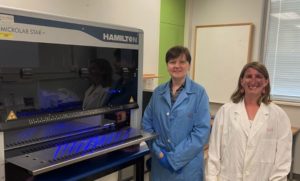
Important research into developing a biological marker for motor neurone disease (MND) will expand with new FightMND funding announced this month.
The latest $250,000 Impact Grant will help Flinders University experts build on developing ways to measure proteins found in the urine of people with MND, which promises to help track progression of the disease – in particular during clinical trials of much-needed drug treatments for the terminal disease with no cure.
Dr Mary-Louise Rogers, Flinders Health and Medical Research Institute senior research fellow, says the urinary biomarker p75ECD is a world-first way to track the effect of MND treatments during clinical trials.

“The team have also recently identified another urinary biomarker called Neopterin, related to the immune system activation, that is increased in MND compared to healthy people,” says Dr Rogers, who also received FightMND funding last year to establish the Ian Davis biomarker research facility at Flinders University’s College of Medicine and Public Health at the Flinders Medical Centre.
“Disease biomarkers can be used to help diagnose patients, predict the rate of disease progression and provide a measurable readout of a drug’s benefit in clinical trials.
“The Ian Davis Biomarker Facility allows for high throughput analysis of large numbers of patient samples from clinical trials to be assessed for these MND biomarkers rapidly and effectively,” says Dr Rogers. “Grouping patients with similar speed and severity of MND will help with clinical trial patient recruitment and increases the chance of identifying effective treatments in vital clinical trials.”
Currently, there are only two approved treatments for Motor Neuron Disease, Riluzole and Edaravone, which on average only extend the life of a patient by a few months.
This year, public donations to FightMND will see $10.68 million channelled into MND research projects across Australia.
The Flinders University research team will also support two other gene therapy projects in this year’s funding round.
FightMND co-founder and AFL great Neale Daniher thanked the community for its ongoing commitment.
“I extend my gratitude for the contribution our supporters, our army has made, you are the true heroes of the fight,” he says.
“The significant and positive impact this funding will have on MND research and fostering hope for future generations cannot be underestimated.
“The funds committed will support both projects, and people, and I thank the many talented researchers, and their teams, around Australia for working so tirelessly to solve the puzzle that is MND.”

